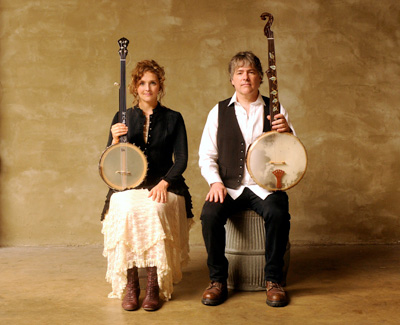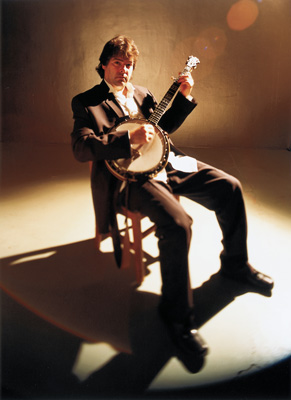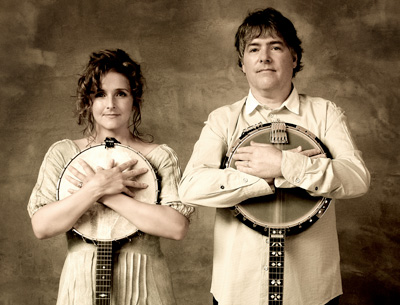"That feeling I get as a banjo player who's often in the middle of music that doesn't normally have banjo in it, [is] that someone will stand up and point at me and yell 'what the heck is he doing here!' "
Bela Fleck
An Interview with Bela Fleck
MIM to Host Bela Fleck & Abigail Washburn in Concert 6/10
By Mariah Fleming

Bela Fleck, widely regarded as the finest banjo player in the world, and Abigail Washburn, whose spellbinding singing and clawhammer banjo have garnered international acclaim, return to MIM in two shows on June 10th. They first wowed audiences at MIM in May 2014. The two met at a square dance about ten years ago. We’ve all heard the old romance movie line, "We could make beautiful music together!" In the case of these celebrated banjoists, it's more than true. When Fleck heard Washburn sing, he knew something extraordinary was happening. Indeed. Their unique musical collaboration is being embraced with enthusiasm everywhere they tour.
For nearly a decade as a couple, in spite of both being superb musicians with highly acclaimed banjo expertise in common, Fleck and Washburn basically kept their musical professions separate. They married in 2010, Fleck wrote a banjo concerto in 2013, Washburn released her acclaimed "City of Refuge" in 2011, they had a baby, Juno, in 2013 and finally released their self-titled duo album in October 2014. The album could have been called Banjo Love, but it's baby love that underpins their remarkable collaboration. Making a bus their home, with baby boy Juno and half a dozen or so banjos aboard, an idyllic life of purposeful wanderlust appears to be the couple's musical journey.
It seems their match is infused with serendipity. After college, Washburn took a u-turn. She was a Chinese-speaking lobbyist in training, on the way to law school in China. Before leaving for law school, Washburn bought a banjo, traveled in her red truck through Appalachia, ended up jamming at a bluegrass convention in Kentucky and being invited to Nashville to make a record. Since then she's been recording and touring, breaking through boundaries both musical and political. In the Sparrow Quartet, Washburn and Fleck were the only American group ever invited to play in Tibet.
Musically, both Fleck and Washburn are world travelers, in a literal and figurative sense. Washburn has a nearly two-decade relationship with China. She tours there and has an all girl music group, The Wu Force, based in China. A uniquely captivating singer, songwriter and clawhammer banjo player, she believes in the power of music to change the world. Washburn did a TED talk entitled "Building US-China Relations Through Banjo" in 2012. Abigail Washburn | Speaker | TED.com. On her profile it says, "She pairs venerable folk elements with far-flung sounds, and the results feel both strangely familiar and unlike anything anybody's ever heard before." That's an understatement. Snap up your tickets before they're gone. Ticket info at MIM.org.
In the following interview, Bela Fleck talks about, among other things, why they waited so long to do an album together, what their collaboration brings them professionally and personally, his new documentary "The Imposter - How to Write a Banjo Concerto" and what it's like navigating life on the road with baby Juno.
Q & A with Bela Fleck

Q.I first saw you play with New Grass Revival in Toulouse, France in 1983. I've been awed by the unparalleled progression of your creativity ever since. Your astonishingly varied work has redefined the banjo; given it newfound respect and a sense of wonderment. You seem fearless when it comes to your music. Have you always been motivated to sail in uncharted waters?
A.First, thanks for these compliments! I was kid who loved stories of the frontier, and really bought into the old American ideal, which involved pushing further and further west into unknown and dangerous lands. Star Trek was inspiring that way too. And the 1960's were so full of iconoclastic forward leaning musicians; they became my heroes and inspirations.
Q.In the past few years you've experienced a lot of "firsts." In May 2013, your first two superlative stand-alone solo banjo shows at MIM. Not long after, you and Abigail had your first child. In 2013 you released the critically acclaimed documentary "The Imposter - How to Write a Banjo Concerto." In 2014 you made your first album with Abigail. How did you manage to do all of those things with a new baby?
A.It's so much more challenging to try to keep the pedal down when raising a little one. Now that we are two years into it, I have no idea how we've managed to get everything done that we have. Fortunately Juno appears to be very happy and developing perfectly, so I don't feel that he's been harmed in the process. And the more time goes by as a father, the harder it is to justify leaving town without him, or choosing to work rather than to hang out with him. Traveling with Juno on tour is a joy, and of course Abby is the key reason for that. I have several projects that I have committed to, such as writing my second banjo concerto, and producing a live album with Chick Corea, and somehow I will get these projects done - I don't know how - but somehow I will!
Q.When I interviewed you for your first concert with Abigail at MIM in 2014, you talked about your new baby bus for Juno. How is Juno adapting to life on the road?
A. Juno seems quite happy wherever he is, as long as momma is pretty close by. Touring continues to be a happy adventure. We don't have our own bus, so it's not custom modified, it's just full of what he needs, from books to diapers to bananas!
Q.You and Abigail communicate through your instruments in your concerts. You have a complete sound with just two people. How many types of banjos do you take on the road?
A. We usually carry about 7 or 8 banjos. The types are 5-string open back, 5-string bluegrass, baritone, cello, uke, and sometimes bass banjos. And we do work hard on the arrangements, to get a full sound. The multiple banjos in different registers help with that.
Q.The album you and Abigail made together is mesmerizing…full of great stuff…original songs, Appalachian murder ballads, blues, gospel tunes, songs from the American Bible Belt. I love that you sing on part of your duo album! How did you and Abigail decide what songs to use on your first collaboration? Had you talked about working as a duo before Juno was born?
A.We've been interested in doing a duo for some time, although Abby was concerned that not being as well known as I was, folks would feel like I was only playing with her because we were married. I told her that as soon as they heard her sing and play, they would know that was not true! But it was Juno's impending birth that made us commit to being a full time duo. That's when we realized that we could not be together as a family as much as we knew was important - unless we started performing together. The fortunate thing is that the duo has been embraced, and we can make a living playing together.
Q.I read that one of the songs on your duo album "And I Am Born to Die" pays tribute to your old friend Doc Watson. What was the most profound thing you learned from knowing him?
A.Doc had a way of making you feel warm and happy. I got to perform with him many times, most notably on his bluegrass album, "Riding On That Midnight Train." It was an unusual thing for a modern player like me to be asked to play with someone with such deep traditional roots, and I took it very seriously. During the sessions he made some sweet comments about the sound I was getting from my banjo, and that was very validating. I learned from watching him how important communicating with the audience was, and it certainly put him in a different league as a performer than some other very talented traditional musicians. Abby was also hugely inspired by him, and attended his funeral, in Deep Gap.
Q.Abigail's vocals are breathtaking. She's also a great claw hammer banjoist and songwriter. Watching the two of you work together is enchanting. The musical synergy between you is unique, really wonderful. When was the first time you played together?
A. I agree that she is a very special vocalist. Our first real duo gig was for Abby's grandma's church. We were surprised how easy it was to perform together, and resolved to do a lot more someday. The first time we played a song together was probably for her niece and nephews when they were little kids, over a holiday visit.

Q.Your critically acclaimed documentary "The Imposter - How to Write a Banjo Concerto" about the banjo concerto you composed for the Nashville Symphony Orchestra is superb. Did you just wake up one day and say to yourself "I want to write the first banjo concerto!" And why did you title it "The Imposter"?
A. Thanks! I got to watch several friends do their first concertos (Edgar Meyer, Mark O'Conner, Zakir Hussain, Chris Thile) and I felt that I needed to do one myself. I was scared to take it on, until I got to collaborate on a couple of concertos with Edgar leading, and one that included Zakir Hussain as an equal collaborator. But still the stand-alone banjo concerto hadn't been created, and I needed to get on with it. Luckily Nashville Symphony thought it was a good idea, and commissioned me to compose it. The title refers to that feeling I get as a banjo player who's often in the middle of music that doesn't normally have banjo in it, that someone will stand up and point at me and yell "what the heck is he doing here!" Hasn't happened yet, but it might one day!
Q.The process of making your documentary and the process of writing your symphony seem as if they might be similar. They're both collaborative and long term. Is each a fulfilling experience in a different way?
A.There is a running theme about asking for advice about creative stuff, getting opinions and the problems that they can create. Great art is not typically created by committees or focus groups, though. So in the end I think the artists have to figure this stuff out for themselves. Unless their art is a group art form, like a band for instance.
Q.This is the second documentary you've done with your brother Sascha Paladino. We talked about the award winning "Throw Down Your Heart" in a 2013 interview. Do you think that, as brothers, being objective about the work you do together is easier or more difficult?
A.Sascha's always been real good at not taking me too seriously, while being respectful - which is not an easy thing to pull off. His objectivity is excellent, mine - fair...
Q.Will you be playing anything from your banjo concerto at your show with Abigail?
A.I'm not sure, some nights I do, and some I don't. Maybe.
Q.You've taken your music all over the world, and I've heard you say there are instruments like the banjo everywhere. In "Throw Down Your Heart" you went in search of the origins of the banjo in Africa. What are some of the banjo like instruments in other cultures that especially intrigue you?
A. The Chinese Pipa and Erhu are banjos of a sort. And there are Indian banjo instruments, like Sarod, and the Tuvans and Mongolians have banjos too. Walk around MIM and you'll see a ton of banjo brethren.
Q.Abigail has had a special kinship with China since college days. She speaks fluent Mandarin and sings in Chinese. You've been with her to China several times. I understand that she has a "girl band" in China. Have you heard them and what is their music like?
A. Her girl band in China has included several excellent players of traditional Chinese instruments like the ones I just mentioned, and gu-gheng. It's really special, and I wish she had more opportunities to focus on that group. It's been quite a while now since she's been to China. We are working on solving that problem, and hope to go again in the next year or so.
Q.Have you had a chance yet to tour the MIM with Abigail and Juno? If so, did Juno like any of the exhibits especially well?
A.Oh yes - it was fabulous, we all loved it, and we will certainly tour it again when we come back this time!
May, 17, 2015
Contact the author of this article at Editor@MusicAndMoreAZ.com.